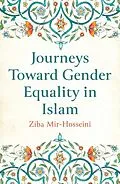If justice is an intrinsic value in Islam, why have women been treated as second-class citizens in Islamic legal tradition?
Today, the idea of gender equality, inherent to contemporary conceptions of justice, presents a challenge to established, patriarchal interpretations of Shari'a. In thought-provoking discussions with six influential Muslim intellectuals ? Abdullahi An-Na'im, Amina Wadud, Asma Lamrabet, Khaled Abou El Fadl, Mohsen Kadivar and Sedigheh Vasmaghi ? Ziba Mir-Hosseini explores how egalitarian gender laws might be constructed from within the Islamic legal framework.
Autorentext
Ziba Mir-Hosseini is a legal anthropologist. A professorial research associate at the Centre for Islamic and Middle Eastern Law, SOAS, University of London, she is founding member of Musawah: Global Movement for Equality in Muslim Family Laws, and the convenor of its knowledge-building initiative to rethink the notion of male authority in Muslim family laws. Among her books are: Marriage on Trial: A Study of Islamic Family Law in Iran and Morocco (IB Tauris, 1993), Islam and Gender: The Contemporary Religious Debate in Iran (Princeton University Press, 1999), Gender and Equality in Muslim Family Law: Justice and Ethics in the Islamic Legal Tradition (co-edited, I. B. Tauris, 2013). She has also co-directed two award-winning documentaries: Divorce Iranian Style (1999) and Runaway (2000).
Klappentext
Following the birth of Islamic feminism at the end of the twentieth century, the idea of gender equality - inherent to our contemporary conceptions of justice - has presented a challenge to established, patriarchal interpretations of Shari'a law.
Through a series of thoughtful, enlightening conversations, Ziba Mir-Hosseini explores journeys towards gender equality in Islam with six influential Muslim intellectuals - Abdullahi An-Na'im, amina wadud, Asma Lamrabet, Khaled Abou El Fadl, Mohsen Kadivar and Sedigheh Vasmaghi. Beginning from the premise that the Qur'an indicates the path toward justice, rather than a precise definition of justice, they discuss how new forms of scholarship and activism are speaking to gender equality from within the Islamic legal framework.
